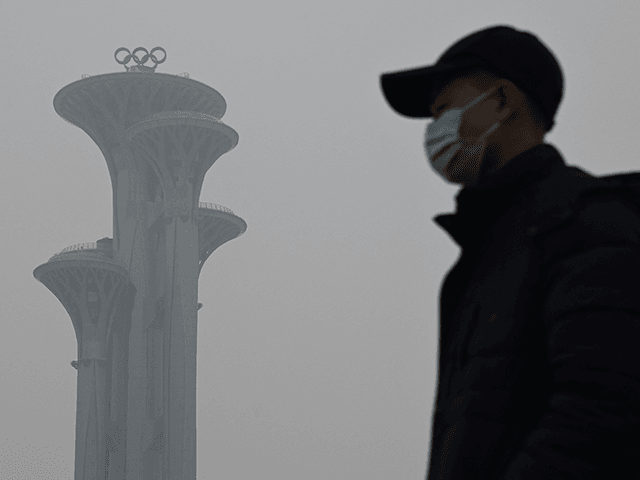Liu Youbin, a spokesman for China’s Ministry of Ecology and Environment, on Monday promised “administrative measures” would be taken to clean up the heavy cloud of smog that has descended over the city of Beijing on the eve of the 2022 Winter Olympics.
Liu said the Winter Olympics and Paralympic Games have the misfortune to “coincide with the end of winter and the start of spring in northern China, when weather conditions are extremely unfavorable.”
Liu warned “enterprises and vehicles with high pollution levels” could face “control measures” and “emergency plans” to curb the embarrassing level of smog in Beijing.
The current saturation of hazardous particles in the air of Beijing stands at 205 micrograms per cubic meter, Reuters reported.
Chinese residents maintained their optimism despite a warning issued that weather conditions ahead of the #Beijing2022 Winter Olympics are ‘very unfavorable’ when it comes to air quality https://t.co/jTx0AItXOV pic.twitter.com/B8OQrUXsIe
— Reuters (@Reuters) January 24, 2022
China’s professed standard for clean air is 35 micrograms, a level Beijing only met for a portion of 2021 due to coronavirus lockdowns. The World Health Organization advises keeping these particles at 5 micrograms per cubic meter or less.
205 micrograms seems like a dangerous level of air pollution for high-performance athletes, and Beijing clearly did not want the world to see a skyline that looks like an ashtray. China is the world’s worst polluter by far, and its reliance on dirty coal power has increased even as the regime loudly proclaims its respect for the climate change movement.
The city of Beijing made a great show of staging a “green” Olympics, ostentatiously planting trees, building solar farms, and pushing high-pollution industries outside city limits in a cleanup campaign that began soon after it won the 2021 Winter Olympics in 2015.
City residents and foreign visitors noted some improvements in air quality during the heavy pandemic lockdowns, but on Sunday the city returned to a purple “very unhealthy” alert on its municipal smog tracking smartphone app, and the odds are not good for significant improvement before the Olympics begin. Outdoor exercise is not recommended during purple air quality alerts.
The Winter Olympics could highlight China’s innovative — and troubling — efforts to control the weather https://t.co/ce1VqmhCul
— The Washington Post (@washingtonpost) January 24, 2022
“Even after all the progress in controlling emissions, the vast concentration of industry around Beijing means that when the weather is unfavorable, smog returns,” Lauri Myllyvirta, lead analyst for Finland’s Center for Research on Energy and Clean Air, sighed to the Washington Post on Monday.
The Washington Post speculated Beijing officials might deploy an “expansive weather modification program that uses cloud-seeding technology to increase rainfall in an attempt to flush out dirty skies,” or risk shutting down nearby factories and steel mills, although the cost of doing so would be enormous.
Steel mills were ordered in October to cut their output by 30 percent between January 1 and March 15 to improve air quality for the Olympics, the South China Morning Post noted.

COMMENTS
Please let us know if you're having issues with commenting.